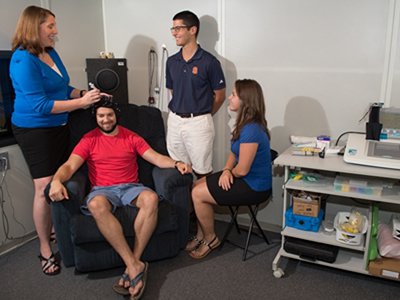National Awards for Students in Auditory Research Lab
Members of Vander Werff lab recognized for academic excellence

In the Auditory Electrophysiology Research Lab of Associate Professor Kathy Vander Werff, students play an important role in the research being done. Their commitment to the field of communication sciences and disorders is clear to their mentor—and now their academic excellence has been recognized by others outside the University.
Graduate student Sidorela Doci '16 was honored with an award from the American Speech-Language-Hearing Association; Ph.D. student Kenneth Morse received a research travel award to attend the upcoming American Speech-Language-Hearing (ASHA) Convention this month; and Vander Werff and several students won an award for a poster presentation at the American Academy of Audiology.
Vander Werff and her team focus on the physiological measurement of hearing function in humans with normal and disordered systems. They examine the mechanisms of auditory perception to improve the diagnosis and remediation of hearing loss and auditory perceptual problems.
A member of the Department of Communication Sciences and Disorders in the College of Arts and Sciences and a member of the neuroscience faculty, Vander Werff is proud of the students and notes how the awards provide an extra boost to the students on their professional path. “The student awards are both geared toward encouraging and preparing students for future careers in academic research in our field,” she says.
While finishing up her undergraduate studies this past spring semester, Doci, who started this fall in the graduate audiology program, was awarded a 2016 Students Preparing for Academic-Research Careers (SPARC) Award from the American Speech-Language-Hearing Association. The SPARC Award provides opportunities for students to participate in mentored teaching and research activities through a mentoring plan over the course of 15 months. Doci is mentored by Vander Werff.
“Sidorela’s award is a tremendous opportunity to provide mentoring and hands-on experience in teaching and research from an early stage in her clinical doctorate program, with an eye toward supporting and encouraging her in a future academic research career,” Vander Werff says. “Sidorela and I developed a detailed mentorship plan, including teaching and research activities over the next 15 months, and the chance to attend a national research conference. This will be an invaluable experience for her if she decides to go on to pursue a Ph.D.”
Kenneth Morse, an Au.D./Ph.D. graduate student, received the Audiology/Hearing Science Research Travel Award (ARTA) to attend the 2016 American Speech-Language-Hearing (ASHA) Convention in Philadelphia Nov. 17–19. The award is available to Au.D. and Ph.D. students and postdoctoral fellows in audiology or hearing science who have expressed an interest in pursuing a research career in communication sciences and disorders.
“Kenny’s award is geared toward allowing students in audiology access to attend the ASHA convention, the largest convention in the fields of speech, language and hearing,” Vander Werff says. “The goal in having Kenny attend this meeting is to fuel his interest in hearing research and give him an opportunity to network and interact with leaders in the field, especially in his interest area of tinnitus. He will also have the chance to connect with other students pursuing Ph.D. careers.”
Vander Werff and four of her students were also recognized earlier this year for a poster presented at the American Academy of Audiology annual convention held in Phoenix. They won an award for “Excellence in Electrophysiology” for their work, titled “Effects of number of talkers and spectrotemporal content of informational masking on the CAEP.” The students who worked on the project were Au.D./Ph.D. student Chris Niemczak, former Au.D. students Stephanie O’Flaherty and Selina Rekola and then-undergraduate student Doci.
The research represented a series of projects that Vander Werff has been working on with her students. “We have been interested in looking at one of the most difficult challenges for both normal-hearing and hearing-impaired people—understanding someone talking to you when there is a lot of noise in the background. The most difficult challenge is when that background noise is other people talking,” she says.
Vander Werff and her team use neural recordings to see how the brain and auditory system process and encode speech information when there is background noise, and how different types of background noise might change that processing.
“This is both a basic and complicated question, and we have been really excited to see some of the results that show that even in the normal hearing young adult brain, background noise—that is other people talking—has a much bigger effect on the neural response than does something like white noise,” Vander Werff says. “We hope this is something that we can apply to a better understanding of hearing loss and problems in the central auditory system due to aging, head injury and other disorders. Winning this award was exciting for the students and for me personally, as it recognized the hard work and importance of this area of research.”
